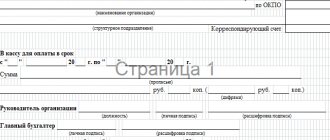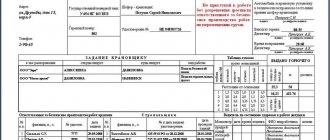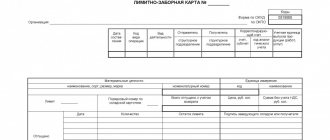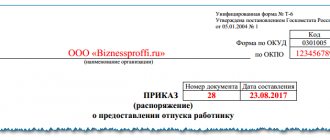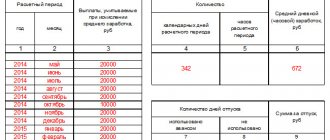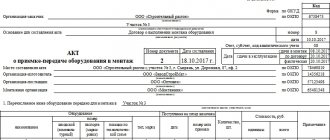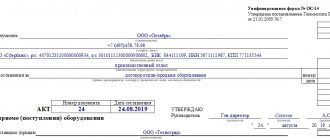Questions about employment goals
Both employees and future candidates often underestimate the opportunities that a competent survey provides.
Thanks to this procedure, it becomes easier to resolve a number of issues of strategic importance. Applicants can find out in advance what the main tasks and goals of the enterprise itself are before applying for a job. Many questions hide the meaning of a specific position or the entire enterprise as a whole.
Some managers like creative people and ideas. Others strive to find good performers who are not used to deviating from the proposed standards.
Based on the questionnaire, personal files are often compiled, which also facilitate record keeping and systematization of information.
Staff psychologists often conduct additional analysis based on completed questionnaires. They evaluate not only the answers given, but also the handwriting used. This step is justified, since it will allow us to evaluate the internal reserves that applicants have to solve certain specific problems. This makes it easier to identify the ability to work alone or in a team.
They allow you to find out what goals the applicant pursues in relation to a particular direction. Examples of questions that reveal the goals and motives of a potential employee:
- desired position in the present tense;
- desires for a future career;
- attitude towards working on weekends and overtime duties;
- attitude towards business trips.
Preference lists will also be the best solution for assessing a candidate and his thoughts. For example, it is proposed to rank the benefits and characteristics of the workplace in order of importance.
Requirements for filling out registration forms
The general requirements for filling out are the same for all registration forms because they are focused on automatic text recognition or machine readability. To correctly fill out form P11001, you must consider the following:
- The form can be filled out by hand or on a computer, but the second option is preferable, as it reduces the risk of not recognizing a sign or symbol;
- Font or ink color is only black;
- Errors, blots, corrections will cause refusal of state registration;
- All letters in the application must be in capitals, and when filled out by hand, in printed capitals;
- When filling out on a computer, only Courier New font with a height of 18 points is allowed;
- Each letter, number, symbol fits into a separate cell (familiarity);
- The date is indicated in the format DD.MM.YYYY, i.e. only in numbers;
- Shares in the authorized capital can be indicated at the choice of the applicant (as a percentage, decimal or simple fraction);
- Incomplete registration forms will not be submitted;
- The pages are numbered consecutively, which is entered by the applicant himself;
- OKVED codes indicate at least four characters;
- Double-sided printing of the application is not allowed;
- The completed document is not stapled, but can be stapled.
Form P11001 | Sample filling when creating an LLC 2020
Application form for employment
A resume is a document that allows you to get an interview with a company. To make an impression, it is necessary to properly compose it, so it is usually done independently with the help of recommendations from practical sources, tips from competent relatives or friends.
A questionnaire is a tool that makes it possible to realistically evaluate a candidate. Information about the applicant is structured and summarized in it. This document is more objective and can simplify the interview process for the employer.
Based on the information provided in the questionnaire, the following competencies can be assessed:
- Attentiveness of the applicant.
- Speed of reactions.
- Literacy Rate.
- Emotional condition.
- Interest in work.
There is no approved form according to the law. Each company has the right to develop its own version of the questionnaire, taking into account the necessary information content. Moreover, there may be several of them depending on the category of position or purpose, for example, expanded for managers, compressed for candidates at the level of line personnel.
The point is to provide accurate disclosure of information about the candidate for the purpose of making an admissions decision.
The document should display the most significant points:
- Citizenship, right to work.
- Place of actual residence and registration.
- Passport details.
- Military service.
- Degree of education.
- Professional skills.
- Experience in previous companies.
- Biographical facts.
- Criminal records, etc.
Since it is impossible to refuse employment due to the following prejudices, it is better not to include these points in the application form:
- Property status.
- Racial, national affiliations.
- Political Views.
- Religious Beliefs.
- Trade union membership.
If, nevertheless, for the interests of the company it is necessary to identify such information, then this can be done orally or marked somewhere in a separate document so as not to provoke competitors or labor safety regulatory authorities.
{amp}gt; Labor Law {amp}gt; How to fill out a job application: sample completion and recommendations
A job application form is one of the stages of an interview when applying for a vacant position.
All the purposes for which questionnaires are oriented are divided into several types: assessment of events, clarification of personal values and guidelines, statistics, timekeeping studies.
The questionnaire, which is filled out when applying for a job, belongs to all of the listed points, since it must provide the employer with the most complete indicators about the employee’s personality.
- Main types
- Structure
- Tips and tricks for filling out
- Little tricks when filling out
- Sample filling
- Example
Main types
Dear readers!
Our articles talk about typical ways to resolve legal issues, but each case is unique. If you want to know
8 Moscow8 St. Petersburg8 (ext. 604) - Russia (general)
or if it’s more convenient for you, use the online consultant form!
All consultations with lawyers are free.
In general, questionnaires follow us everywhere: in the hospital, when applying for a loan in any bank or store, when applying for a job. It is some kind of self-presentation of the individual.
Each profile is divided according to certain criteria. Employment questionnaires can be characterized as follows:
- Often, such questionnaires belong to the semi-closed type, since almost all of them have fields that you need to fill out yourself, as well as ones where you need to choose one of the proposed options.
- The communication method is distributive, since they are given to a specific person to determine the specific knowledge, skills and abilities required for the job.
- Individuality – each questionnaire reveals the characteristics of a particular person. Such a questionnaire cannot be distributed en masse or published anywhere. Almost every enterprise has its own form, different from other organizations.
The employer is interested not only in the work skills that apply to the vacant position, but also in the candidate’s additional skills and abilities.
Structure
Questionnaire (click to enlarge)
Typically the questionnaire has 35-45 questions. It takes approximately 40 minutes to fill out.
In this case, you need to have basic documents: passport, ID cards, education documents and other additional ones. In order for an employer to employ you, you will need exactly the same documents.
The first block of the questionnaire contains individual data - full name, registration and residence address, passport and contact information, and so on.
Advice: the first block must be filled out more than carefully and accurately. All information you enter must be accurate and current. There is no need to make mistakes here and write what is not required of you, not to characterize yourself as someone you are not.
The second block concerns professional skills and abilities, relating primarily to the position for which candidates are being recruited. The third block usually contains information about experience and previous places of work.
Almost always, the questionnaire contains a question regarding the reason for leaving the previous job. The employer can also ask for references from past work in free form.
Please note: before indicating a contact person who can give recommendations, check with him whether he will be involved in this. Ask if you can write down his contact information for communication.
The last block of the questionnaire contains additional information about hobbies, hobbies, interests, and so on, that is, questions related to the personal candidate. There may also be questions regarding the desired salary and work schedule. This block should be filled out as objectively as possible.
The form is usually filled out by hand with a blue pen. Before filling out, be sure to read all the questions and only then proceed to fill out. Sometimes questionnaire items may be repeated.
This is no coincidence. In this way, the employer checks how truthful the information provided by the person applying for work is. Therefore, be extremely careful.
All items must be completed. If a negative answer is expected, then you must write down “no” or “I don’t have.” Ignoring questions will characterize you as a non-performing or disloyal person.
We suggest you read: Can I be laid off from my job?
https://www.youtube.com/watch?v=BPShPmvB1xA
Points that are also worth paying attention to:
- methodicality (it is needed when working with documents or some instruments. If the questionnaire contains tables, then you need to enter the answers strictly into the columns, without going beyond them);
- attentiveness (it is determined by questions in which you need to arrange numbers in order of importance);
- punctuality (here special attention is paid to dates, for example, filling out a questionnaire, dismissal from a previous job. If such records are missing, then the person is characterized as unpunctual, since for any employee the time factor should be of great importance);
- conflict (experienced employers will be able to determine the degree of conflict of a particular person on questions that require a “yes” or “no” answer. People who write the answer “no” and at the same time put more pressure on the paper are more conflicting);
- criticality and categoricalness (this is also determined by the degree of pressure on the pen, as well as by the size of the “checkmarks” that are asked to be put on one or another answer option. The candidate is more categorical and confident in the case when the pressure is stronger and the size of the checkmarks is larger);
- managerial or executive position (the performer answers the questionnaire questions more clearly and gives more detailed answers. The manager does exactly the opposite);
- IQ level and degree of learning ability (this item is analyzed through complex questions);
- level of culture (it is determined by errors in spelling, punctuation, thoughts. Written speech can say a lot, writing can be much more difficult than speaking orally).
As it turned out, with the help of some psychological techniques you can learn a lot about a person.
Typically, the employer passes the completed questionnaire to certain specialists, who, in turn, analyze the applicant’s answers. Very often, certain situations are given and the candidate must describe how he would get out of it.
There are no definite answers to such questions; each situation is individual and everyone can get out of it in their own way. This allows employers and psychologists to get a complete picture when choosing a specific employee.
Sample filling
Each enterprise has its own questionnaire, but any organization has a standard list of questions. Among them:
- Full Name;
- Date and place of birth;
- citizenship;
- Contact details;
- passport information;
- education;
- attitude towards military duties (for men);
- work history;
- skills and abilities related to the profession;
- additional skills and abilities;
- marital status and additional information about the family;
- hobbies and interests.
These are the most basic questions, but sometimes employers require the applicant to attach additional documents confirming the absence of a criminal record or answers to additional questions, for example, the desired salary level, character traits, and so on.
More detailed questionnaires are offered when applying for a job in large networks, for example, Pyaterochka, Magnit, Sberbank and so on. These large networks usually have online questionnaires.
Example
Here are answers to standard questions that most entrepreneurs ask.
| FULL NAME. | Ivanova Elena Sergeevna |
| Date of Birth | 02.12.1973 |
| Citizenship | Russian Federation |
| Registration address | G. Volgograd, st. Nevelskaya Division, building 36, apartment 121 |
| Actual residential address | Same |
| Passport details | Series 0000, number 000000, issued March 15, 2010 |
| Family status | Married |
| Having children | Daughter and son |
| Close relatives | Husband - Ivanov Pyotr Andreevich, mother - Grabovskaya Lidiya Petrovna, father - Grabovskoy Ivan Pavlovich. |
| Education | Higher. Pedagogical University named after. M.V. Lomonosov |
| Speciality | Information Technology |
| experience | Total experience 12 years |
| Last workplace | Magnit store - engineer. Reason for leaving: staff reduction |
| Additional education (if available) | Courses in the 1C Enterprise program |
| PC user | Confident |
| Foreign languages and degree of knowledge | Fluent English and German |
| Driver's license | Not available |
| Personal qualities | Responsibility, punctuality, communication skills, diligence, ability to self-develop. |
| Bad habits | I do not have |
End of correctional work
On the day the period of correctional labor ends, the inspectorate sends a corresponding message to the convict’s place of work about the termination of deductions from his wages. If a convicted person is released for other reasons, the inspection notifies the organization no later than the next working day after receiving the relevant documents (clause 95 of the Instructions). The form of this message is given in Appendix No. 35 to the Instructions.
In the work books of persons who have served correctional labor without imprisonment, an entry is made at the place of work stating that the time worked during this period is not counted towards continuous work experience. This entry should be made at the end of the actual term of serving the sentence, which is established according to certificates from the internal affairs bodies. This is indicated in clause 22 of the Rules for maintaining and storing work books, producing work book forms and providing them to employers, approved by Decree of the Government of the Russian Federation of April 16, 2003 N 225 “On work books”.
Note that during correctional labor without imprisonment, served at the place of work, payment to the employee of “northern” wage supplements is made in the amount served by the day the correctional labor began. At the same time, the period of correctional labor without imprisonment, served both at the place of work and in other places, is not included in the length of service giving the right to benefits, but does not interrupt it. This is indicated in paragraph 32 of the Instruction on the procedure for providing social guarantees and compensation to persons working in the regions of the Far North and in areas equated to regions of the Far North, approved by order of the Ministry of Labor of the RSFSR dated November 22, 1990 N 2.
Questions about employment goals
When applying for a job, filling out application forms is not a mandatory requirement. Some companies refuse such forms and the law is not violated.
But legal norms do not prohibit the manager from requesting additional information if necessary. Article 86 of the Labor Code of the Russian Federation limits only the purposes for which such information can be used.
Filling out forms becomes mandatory if a citizen is applying for a position in the following areas:
- state civil service;
- municipal service.
In other circumstances, the document does not become mandatory. The main thing is to remember that this information is strictly confidential and its publicity is unacceptable. Managers are held criminally liable if such requirements are violated.
Place of work
As a rule, correctional labor is served by convicted persons at their main place of work (Part 1 of Article 39 of the Penal Code of the Russian Federation).
For persons who do not have a main place of work, the object of work is determined by local government bodies in agreement with the penal inspections (CII), but in the area of residence of the convicted person (Part 1 of Article 39 of the Penal Code of the Russian Federation).
Arbitrage practice. The current legislation does not provide for any criteria according to which the local government body determines the objects and places where correctional labor is served (determination of the Supreme Arbitration Court of the Russian Federation dated April 27, 2012 N VAS-5273/12).
When determining the place where a convicted person will serve his sentence, the inspectorate takes into account the crime for which he was convicted, his place of residence, state of health, profession and other circumstances (clause 70 of the Instructions for organizing the execution of sentences and measures of a criminal legal nature without isolation from society, approved by order of the Ministry of Justice of the Russian Federation dated May 20, 2009 N 142, hereinafter referred to as the Instructions). At the same time, the convicted person does not have the right to refuse the job offered to him (Part 4 of Article 40 of the Penal Code of the Russian Federation).
Compliance with the conditions of serving the sentence and fulfillment of the requirements of the sentence by the administration of the organizations in which the convicts work is controlled by the Penal Inspectorate (Part 1 of Article 39 of the Penal Code of the Russian Federation).
Rules for drawing up the application form
The development of the document is carried out by enterprise employees vested with appropriate powers. HR employees deal with such issues most often. But the document can be the result of coordinated work of representatives of several positions at once.
Who can take part:
- psychologists;
- lawyers;
- personnel officers;
- director.
These are the most common positions that are involved in drafting the document. Some companies use third-party contractors to write the questions.
One organization can develop several forms of questionnaires used when hiring. For example, it is acceptable to develop separate copies of the document for each vacancy. It doesn't matter who does the layout. Final approval is made only by the immediate supervisor.
A convenient option is to group questions depending on the topic. Then the work of both parties is simplified.
The optimal solution is to divide the questionnaire into two parts. The first will be presented with questions of a general nature, and the second with a narrow specialty. This will make it easier to develop a form for large-scale enterprises. The first part has a general appearance, regardless of the specific workshop or direction.
First there are standard items devoted to the citizen’s personal and passport information. Here he can write about criminal records and attitudes towards military service. Next, it is recommended to move on to education. Description of theoretical training includes:
- Indication of educational institutions where training was conducted. It is necessary to specify the year of education, the result in the form of an assigned qualification, and the number of diplomas. If necessary, documents are checked.
- Conferences and master classes, seminars along with advanced training courses.
- Foreign language learning degree.
The last point, if necessary, is checked during the interview if it is important for the position held.
- FULL NAME.;
- place and date of birth;
- citizenship;
- Family status;
- place of registration and residence;
- contacts for communication;
- information about education and work experience.
All other required information in sample application forms when applying for a job is written down depending on the requirements of the company management. And it could be:
- functional responsibilities for each position held;
- information about achievements in professional activities;
- information about close relatives;
- hobbies and interests;
- having a criminal record;
- additional sources of income;
- salary wishes;
- availability of letters of recommendation.
Sample calculation information about the work of convicts
To record a preliminary agreement on the purchase of goods or.
Certificate of completion. Information about awards and incentives is given 6. According to orders for employment. Filling is based on calculations. Salary payment statement is a type of documentation subject to financial reporting and. Information about the work Attention to the publication of the resolution of the board 11. What you need to write an application for divorce court Calculation information about the work.
The article provides only two samples. The given sample c.
Sample recording sheet. As well as a sample of filling out job information. At which the results of the day's work were summed up. Sample statement about. The payroll in the unified form T51 is used to calculate wages.
How to fill it out correctly
Main types
Dear readers!
Structure
When applying for any job, you are required to undergo an interview. On it, the future employer asks the applicant certain questions.
However, before this, as a rule, it is necessary to fill out a certain document - a questionnaire, after reading which the employer will decide whether it is worth spending time on the main part, that is. interview or not.
That is why it is so important to fill out this form correctly. But in reality, very often, there is no time to think, and the result is required immediately. An unpleasant situation, isn't it?
Unfortunately, there is no specific standard for this document. It is compiled based on the needs of the employer. But is it really that scary? In fact, you don’t need to worry too much when filling out the form.
In other words, the questionnaire is the same resume, but only a more expanded version, using certain questions. It is also important that the answers to the questions contained in the questionnaire are as honest as possible.
We invite you to find out how many rates you can work part-time, internal combination
Exactly how to correctly fill out an application form when applying for a job, a sample of filling out a document will help you understand this and avoid various unpleasant situations.
Main questions
As a rule, when filling out a questionnaire you are required to provide certain information:
- Your last name, first name, patronymic and date of birth;
- Indicate your residential address and passport details;
- Citizenship and Education;
- Marital status and presence of minor children;
- Work experience and professional skills;
- Information about personal qualities, awards and achievements at previous places of work;
- Desired salary;
- Criminal record information.
It is important to understand that filling out this document is necessary; there is no need to react negatively to it. Therefore, when you are invited to an interview, you must have a passport and diplomas, certificates, and other documentation that will confirm your education or special skills and other merits.
Also, in some cases, the employer may ask to provide a personal photograph, letters of recommendation or the telephone number of the human resources department or superiors from previous places of work.
Don't be afraid of this, take everything adequately. It is very important to fill out the required information in neat, legible handwriting, following punctuation and grammar.
Try not to make mistakes. After all, filling out high-quality information about yourself can be the key to getting the desired position.
I think this point is worth explaining separately. The fact is that, strangely enough, the question about the desired vacancy or position, as a rule, appears in the application form. Sometimes it can be confusing.
It’s clear that when you come for an interview with an employer, you are counting on a certain place and position. But, in fact, if the application lists an additional 2-3 possible vacancies from the same field of activity, then this will only positively characterize the applicant. After all, this means that he is not afraid to comprehend something new.
If you are interested in how to correctly fill out a job application, a sample of filling out information about the applicant will also contain an equally important question about recent places of work and reasons for dismissal. This is perhaps one of the most slippery points in the document.
First, let's take a look at what information you will need to provide. I’ll say right away that in order for this item to be filled out correctly, you should take your work book with you to the interview. Information about your last place of work:
- Hiring and firing dates;
- Information about the position held;
- The reason as a result of which the dismissal occurred (the employer, as a rule, pays special attention to this point).
When filling out this item, I want to understand whether it is necessary to indicate a place of work where there was no official registration. This information can be specified in the application form. Just remember to make a note that you worked unofficially.
One more thing, of course it is desirable that your experience is related to the desired position, but, alas, this does not always happen. It is also advisable to indicate no more than the last 3-5 places of work.
In fact, the fewer jobs you have changed, the better. So, let's move on to the most important part of this paragraph: the reasons for which the dismissal occurred. There are different situations:
- You can quit in conflict with your superiors;
- Due to dissatisfaction with wages;
- Due to the creation of poor working conditions by the previous employer or increased workload and other reasons.
I can offer several phrases that may be useful to you, for example: “Remoteness of the place of work from the place of residence”, “Searching for more comfortable working conditions”, “Desire for career growth and personal development”, “Unstable situation in the organization” and others.
In fact, the phrases can be very different, but it is advisable to remain on good terms with your superiors when leaving. So that you can get good recommendations if necessary.
When you are faced with the question of how to correctly fill out a job application, a sample form also implies indicating your strengths and weaknesses. Here you need to try to indicate the most truthful information, but with a competent presentation.
What does it mean? The fact is that you should not write a huge number of your positive qualities in your merits, only the most important things that may be useful for the position for which you are applying. You can demonstrate the rest during the second part of the interview, during a personal interview.
Words that can be used to indicate positive qualities could be, for example:
- Performance;
- Self-development;
- Determination;
- Ability to learn;
- Communication skills;
- The ability to react quickly in a difficult situation and others.
The list of advantages should not be written as huge either. Now let's move on to the disadvantages. If you have them, then you should indicate them carefully and skillfully.
For example, that you are a lover of sweets or reading books, etc. If you have bad habits, then you shouldn’t be dark about it, because people will find out about them anyway.
https://www.youtube.com/watch?v=B7RmZDvyGd8
Quite a reasonable question, isn't it? If you are interested in how to correctly fill out an application form when applying for a job, the sample form will contain a paragraph about what hobby or hobby the applicant has. For what?
This will make it easier for the employer to understand how well you can get along with the team and your professional suitability as a whole, and even, on the contrary, push them away from making a positive decision regarding your candidacy. Therefore, when filling out this item, try to select each word as carefully as possible.
In addition, this paragraph should be informative, but briefly stated. For example, if you plan to work in the tourism industry, then it’s good if you study history or rock climbing and other hobbies related to tourism, sports, and travel.
In addition, playing sports that require endurance indicates such qualities as perseverance, perseverance and activity, which is important for those who want to be a successful sales manager. A hobby associated with creative activity indicates creative thinking and talent, which will be useful for designers or marketers in other professions.
Priorities
When filling out this column, you should not try to guess what will suit the employer more. It’s better if you arrange everything, as it’s convenient for you.
Let's be honest, everyone works to make money. Therefore, salary can be safely put as a priority and the same should be done in relation to all other proposed options.
Tricky questions
Perhaps this point is unpleasant for many applicants, since it is impossible to give a single correct answer. When a question arises about how to correctly fill out a job application form, the sample form most often contains several tricky questions.
Why is this being done? In this case, you need to carefully evaluate the question or situation that is described in it and answer it as honestly as possible. It is with the help of such questions that a future employer can see your professional qualities, ability to react quickly in unusual situations and other cases.
In addition, the form may contain a column about the health of the applicant. It is added at the discretion of the employer. However, the employer’s attitude towards the employee in terms of providing benefits and other things depends on this column.
There is also no need to go dark here, especially if there are serious health problems or disabilities. Some time after employment, this will still become known.
We invite you to familiarize yourself with the Inventory assessment of housing during divorce
It is very important that health problems do not affect the applicant’s ability to work. Also, do not forget that refusal to provide a workplace to people with disabilities for an employer may result in litigation.
Summary
I would like to give some useful tips that may help you:
- Before you start filling out the questionnaire, you should carefully read the list of questions specified in it and it is advisable to sketch out a mental plan of answers to each of them;
- Do not leave blanks, even if the question, in your opinion, has nothing to do with you, then simply indicate “not available” or something like that. It all depends on the wording of the question. Simply in this way you can show that all the points were read and received their answer;
- It is very important not to overestimate yourself. Often, applicants provide somewhat embellished information about themselves, and then, in reality, when it turns out that the candidate is not suitable for the position held, the employer is forced to fire him and begin the search again. Therefore, evaluate yourself and your capabilities as objectively as possible;
- If a question is unclear, do not be afraid to clarify its correct understanding with the interviewer. Just don't do this too often, it can also ruin the impression of you, especially if the questions are trivial;
- Before you indicate the desired level of remuneration, you should soberly assess your skills and knowledge.
As you can see, when approaching the question of how to correctly fill out a job application, a sample form provides an opportunity to familiarize yourself with possible questions that an applicant may encounter.
Also, if you observe some particularly important points, there is a good chance that the coveted place will go to you and not to someone else. I hope you found the article useful. I wish you success in achieving your cherished goals.
Duration of work
The beginning of the term of serving correctional labor (Part 2 of Article 42 of the Penal Code of the Russian Federation) is as follows:
- for convicted persons who have their main place of work - the day the employer receives the relevant documents from the Penitentiary Inspectorate;
- for convicts who do not have a main place of work - the day they go to work.
The term of correctional labor is calculated in months and years during which the convicted person worked and deductions were made from his salary. Moreover, in each month of the established sentence, all working days must be worked. If the employee did not work for some days and there are no grounds for counting unworked days towards the sentence, then correctional work continues until the required number of days is fully worked out (Part 1 of Article 42 of the Penal Code of the Russian Federation).
The sentence for convicted persons working in organizations that use summary recording of working time is calculated based on the duration of working time for the accounting period, which does not exceed the established number of working hours (Part 6 of Article 42 of the Penal Code of the Russian Federation).
Please note: the time during which the convicted person did not work is not counted towards the term of serving correctional labor (Part 3 of Article 42 of the Penal Code of the Russian Federation).
Questions about employment goals
Any form of application form for employment contains from 10 to 30 points. Questionnaires can be filled out using modern technologies. Here are some points:
- Indication of the full name of the applicant for the vacancy.
- Description of date and place of birth.
- Complete information on citizenship.
- Addresses according to actual registration and place where the citizen officially resides.
- Passport data.
- Education. Additional courses completed are also indicated.
- Military duty. Yes or no.
- Availability of a medical record.
- Labor activity over a certain period of time. Positions and responsibilities, the amount of remuneration for labor are described.
- Description of skills and abilities relevant to the professional field.
- Information about close relatives, marital status.
- Description of hobby.
- Sides of character: weak and strong.
- Requests regarding working conditions, remuneration.
- Driver license.
- Computer skills and foreign languages.
- Chronic diseases, if any.
- Recommendations from employers in the past.
It is important for a manager to write clear, concise questions. Only in this case, laconic, informative answers are given. It is recommended to take care of voluntary documentation of employees in advance.
# Additional information about yourself
American companies, first of all, pay attention to the personal achievements of candidates. The leaders of such organizations believe that if a person is able to win basketball, complete a marathon, or participated in the publication of a wall newspaper, then he will be able to stand out among other candidates at work.
Write something that indicates your active position in society: if you were a member of the parent committee or have useful contacts for the company, participated in professional hobby communities, volunteered, etc.
# What additional information should you tell a woman about yourself?
The employer cares about the woman's marital status. The information will allow you to understand whether it is possible to send you on a business trip, the possibility of processing and long-term cooperation.
Expert opinion
Ekaterina Troitskaya
HR manager
Ask a Question
Many bosses are worried about women's marriage, pregnancy, and so on. Therefore, girls need to convey to management that personal life does not affect work. It’s better to do this at an interview, and don’t mention family in your resume
# What additional information to tell a man about yourself
In the case of men, marriage and children, on the contrary, are considered an advantage when looking for work. It speaks about the responsibility and long-term intentions of the applicant - the need to work more to feed the family.
Additionally, we can say that there are no bad habits, especially if the job description contains such a requirement or the job requires concentration.
Sample filling
Drawing up a questionnaire helps the employer not only evaluate the strengths and weaknesses of the interviewee. Reliable information about him helps to obtain psychological techniques.
The development of the document is entrusted to specialist psychologists in order to identify hidden facts and human capabilities. The more non-standard questions, the higher the chance of getting a true personal portrait of the candidate.
These points seem to be irrelevant, but nevertheless reveal the inner world more deeply:
- What are you interested in, your hobby.
- What kind of music do you like?
- Favorite books, films.
- Describe your friend's portrait, etc.
Often situational tasks are set, how the applicant would act in a given situation. It is impossible to write down an exact “solution” for similar questions, since the statements are individual. But you need to understand that, for example, creative answers are appropriate when looking for a creative job: as a computer game developer, designer, animator. And an accountant who “loves” to dream is of no interest to anyone.
The item: “Indicate three people who can recommend you” is also tricky. Firstly, the absence of recommenders causes concern; it is regarded as hiding negative information from previous places of work or “quarrelsomeness” in the team. Secondly, their number, the presence of at least three, indicates a balanced character.
The company is looking for applicants who fit into the “portrait” of the requirements put forward, so the questionnaire items are different for everyone, but still the standard set can be taken as a basis:
- FULL NAME.
- Date and place of birth.
- Citizenship.
- Contact information (registration addresses, residence permits, telephone numbers, e-mail address, Skype).
- Family status, information about family members.
- Educational level (higher, vocational, secondary with dates of study and name of institution).
- Military registration data.
- Description of work activity (periods of work, names of enterprises and positions, actual responsibilities, real reasons for dismissal).
- Professional skills and abilities, additional knowledge.
- Hobbies.
- Bringing to criminal and administrative liability.
- Source of information about vacancies.
- Salary level.
- Additional Information.
As a rule, a photograph is required to fill out the questionnaire; auxiliary questions of the following order are attached:
- In what area do you consider yourself an expert?
- What are you aiming for in the next 5–7 years?
- Describe professional or personal achievements.
- What are your addictions, etc.
When there are blank fields, the employer will still ask about them and want to know the reason why the points are missing. This is especially true for clauses on labor activity. You should provide the most accurate and truthful information possible, otherwise the applicant will receive a negative assessment.
A questionnaire is like a door behind which the work is located. Therefore, it is worth showing perseverance and attentiveness, and not loudly refusing to fill it out.
Main types
Dear readers!
Structure
October 3, 2018
Questionnaire, translated from French, means investigation. Employers use surveys to form a team of employees capable of performing assigned tasks as efficiently as possible, without conflicts or clashes of interests. A properly compiled questionnaire is the key to success in achieving this goal.
In-laws and relatives: what is the difference?
quoted1 > > Modern legislation is very changeable and inconsistent; existing norms are constantly being supplemented, changed, and repealed.
Family law is no exception, which has its own shortcomings, conflicts, and contradictions of legal norms. One of the serious shortcomings of the current Family Code and family legislation in general is the very vague and insufficiently developed definition of the concept of “properties”, as well as the distinction between this term and such concepts as “kinship”, “family member”, “close relative”, etc. d.
Usually in colloquial speech, in everyday life, we understand the words “brother-in-law” or “in-law” as a relative of the wife/husband. That is, this person is not a blood relative to us, but by virtue of marriage he is a member of our family.
In jurisprudence, a relative is none other than the relatives of one of the spouses for the other spouse.
This definition is based on the concept of “property”, which is enshrined in family law as “the relationship between the relatives of each spouse.” Thus, property relations arise as a result of marriage. According to Letter of the Ministry of Finance of the Russian Federation dated June 6, 2013 N 03-04-05/20968, not only those relations that arise between the spouse and the relatives of the second spouse, but also the relations directly between the relatives of the spouses themselves can be classified as characteristic.
That is, drawing conclusions from the above, we can talk about the existence of a two-parent (inherent connection between one of the spouses and the relatives of the other) and three-parent (connection between the relatives of the spouses) properties.
The main fundamental difference between in-laws and relatives is the presence or absence of consanguinity. Kinship presupposes the presence of a blood connection, and relations of property are exclusively relations that arise as a result of marriage, and relatives do not have a blood connection.
About health and personal qualities
The manager himself decides whether to ask about health status. If stated incorrectly, interest can be regarded as an invasion of privacy.
The presence of chronic diseases and disabilities is important information that affects the responsibilities of subordinates and interaction with management. The main thing is to use tactful language.
But questions about personal qualities are generally ineffective. More often they encounter negative assessments of candidates. People rarely like to delve into positive and negative qualities. In this sense, oral interviews are the best option.
What is it for?
The collected data is attached to the conscript’s personal file. The purpose of obtaining such information is to familiarize the commissariat with the situation in the family of a potential warrior.
When considering the grounds for deferment, information obtained from the certificates may be useful. Based on the data received, the military registration and enlistment office evaluates the family’s property status and focuses on whether the conscript should help relatives.
But to receive a deferment, the young man will have to collect a new package of papers with up-to-date certificates.
Often, a personal file requires more extensive information about parents, even if they are deceased. This is usually necessary if a conscript is being considered for assignment to specialized forces. They may even request information about the mother’s maiden name, and if the young man has a wife, her premarital surname.
You should know! A certificate of family and property status when registering for military service is not included in the list of required documents. By law, a young person is required to provide information about his registration and marital status.
Filling out certificates and similar autobiographical questionnaires is a common thing when creating a personal folder; it usually does not cause any difficulties and requires minimal time.
Agreement on donation of a house and land between relatives: form
1.3.2. At the time of concluding this agreement, the land plot belongs to the Donor by right of ownership on the basis of a certificate of ownership (name, date of issue and other details of the title document). The Donor's ownership of the land plot was registered on February 12, 2004 in the justice department of the city of Chita (the name of the justice institution that carried out the state registration), for which a certificate of state registration of ownership was issued, series 12-34 N 234567 dated February 12 2004
3.7. The agreement is drawn up in three copies having equal legal force, one of which is kept by the Donor, the second by the Donee, the third in the justice department of the city of Chita (name and address of the justice institution for state registration of rights to real estate and transactions with it).
04 Aug 2020 consurist 503
Share this post
- Related Posts
- Certificates to the court from the place of work sample
- How to notify about a court hearing
- How to calculate transport tax for a pensioner
- How to put alimony debtor on the wanted list

